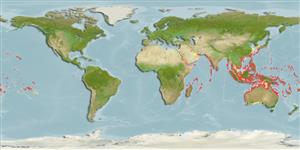Common names from other countries
Issue
Kyphosus species analogus (E. Pacific) and incisor (Atlantic) in Knudsen and Clements, 2013 (Ref. 95491:65) were considered as synonyms of K. vaigiensis.
Environment: milieu / climate zone / depth range / distribution range
Ecologia
marinhas associadas(os) a recifes; oceanódromo (Ref. 51243); intervalo de profundidade 0 - 40 m (Ref. 89972). Tropical; 35°N - 38°S, 25°E - 133°W
Circumtropical: from the eastern Pacific across the Pacific Ocean to the Indian
Ocean, the Red Sea and the eastern and western Atlantic and the Mediterranean.
Length at first maturity / Tamanho / Peso / Idade
Maturity: Lm ?, range 39 - ? cm
Max length : 70.0 cm TL macho/indeterminado; (Ref. 559); common length : 50.0 cm TL macho/indeterminado; (Ref. 5450)
Espinhos dorsais (total): 10 - 11; Raios dorsais moles (total): 13-15; Espinhos anais 3; Raios anais moles: 12 - 14; Vértebras: 26. This species is distinguished by the following characters: elongate and oval-shaped body; scale rows horizontally along the body appear alternately golden and bluish; metallic blue dorsally and white ventrally; caudal fin moderately emarginated; very low dorsal and anal fins; D X-XI,13-15; A III, 12-14; pectoral fin 17-20: teeth incisor-shaped; scales on interorbital region; external side of first gill arch with high number of gill rakers on lower limb 16-23, upper limb 5-10; total lateral line scale rows 63-80, 52-63 has pores; longitudinal scale rows 56-70; vertebrae: precaudal 10, caudal 16; pterygiophores, anal 13-14, dorsal 22-24. Colour of body silvery with a bluish shine, with golden horizontal lines along the body (around 23-29), dorsal lines above lateral line curved along the lateral line;; golden streak beneath eye from snout to behind anterior edge of eye; fins are grey or slightly darker grey than body colour (Ref. 95491).
Aggregate over hard, algal coated bottoms of exposed surf-swept outer reef flats, lagoons, and seaward reefs to a depth of at least 24 m. Found in exposed areas around rocky reefs (Ref. 559); adults usually close to the shore and the coastline, while juveniles are associated with flotsam and can be encountered in the open ocean close to the surface (Ref. 95491). Benthopelagic (Ref. 58302). Usually in groups (Ref. 90102). Young (up to 5 cm) found among floating seaweed; feeding on small crustaceans (Ref. 559). Adults are carnivorous during summer and autumn but feed on Endarachne binghamiae during winter (Ref. 559). Good food fish (Ref. 559). Minimum depth reported taken from Ref. 30573.
Life cycle and mating behavior
Maturidade | Reprodução | Desova | Ovos | Fecundidade | Larvas
Knudsen, S.W. and K.D. Clements, 2013. Revision of the fish family Kyphosidae (Teleostei: Perciformes). Zootaxa 3751(1):001-101. (Ref. 95491)
Categoria na Lista Vermelha da IUCN (Ref. 130435)
CITES (Ref. 128078)
Not Evaluated
Ameaça para o homem
Harmless
Utilização humana
Pescarias: espécies comerciais; peixe desportivo: sim
Mais informação
ReferênciasAquaculturaPerfil para aquaculturaEstirpesGenéticaElectrophoresesHereditariedadeDoençasProcessamentoMass conversion
Ferramentas
Relatórios especiais
Descarregue XML
Fontes da internet
Estimates based on models
Preferred temperature (Ref.
115969): 24.7 - 29, mean 27.8 (based on 896 cells).
Phylogenetic diversity index (Ref.
82804): PD
50 = 0.5000 [Uniqueness, from 0.5 = low to 2.0 = high].
Bayesian length-weight: a=0.01778 (0.01117 - 0.02831), b=3.00 (2.87 - 3.13), in cm Total Length, based on LWR estimates for this species & (Sub)family-body (Ref.
93245).
Nível Trófico (Ref.
69278): 2.0 ±0.0 se; based on diet studies.
Resiliência (Ref.
120179): Baixo, tempo mínimo de duplicação da população 4,5 - 14 anos (Preliminary K or Fecundity.).
Fishing Vulnerability (Ref.
59153): Moderate to high vulnerability (48 of 100).
